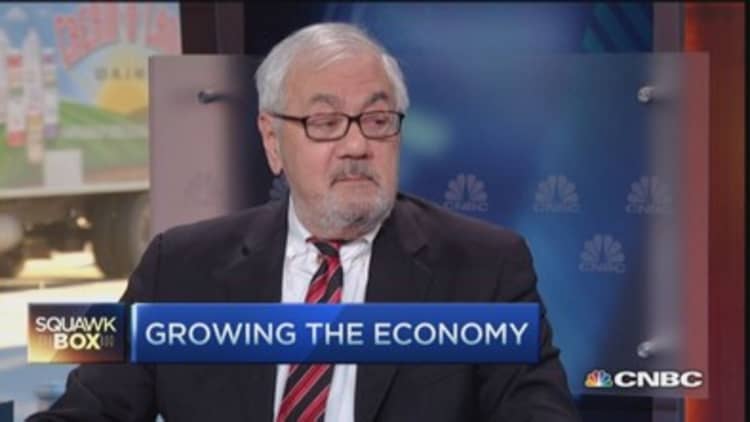
The January jobs report showing a gain of 257,000 positions and a slight rise to 5.7 percent in unemployment had no weak spots, leaving Republicans scrambling for a new angle to attack the economy under President Barack Obama.
The increase in the jobless rate came from a slight uptick in the size of the labor force—a positive sign—so the GOP could not leap on that as a warning sign. In addition, wages grew 0.5 percent, reversing December's decline. The annual rate is still just 2.2 percent but the trend is once again in the right direction. Many economists expect wage pressure to pick up fairly quickly, meaning the Federal Reserve may move to start raising rates by midyear.
Read More US created 257,000 jobs in Jan vs. 234,000 est
One Republican line is that the recent increase in job gains is a direct result of the GOP taking control of the Senate. This is a patently ridiculous argument given that revisions released Friday showed a November gain of 423,000, the strongest of the recovery. Unless employers had a crystal ball—or spent time poring over Senate polling data—the November elections had absolutely nothing to do with faster pace of job creation.
The smarter Republican line now is that while the job gains are indeed good, the full picture is nowhere near as strong as it could be. The labor force participation rate is still at a 30-year low and median incomes remain stuck in the mud.
House Ways and Means Committee Chairman Paul Ryan took this approach on Friday, using the jobs report as a pitch for both corporate tax reform and trade deals in the 114th Congress.
Read More Progressive Democrats and the 2016 conundrum
"This report is welcome news," Ryan said in a statement. "Still, this recovery is too fragile for far too many. And in the long-term unemployed there's a lot of potential that we are still not tapping. That's why the Ways and Means Committee is focused on ideas for durable long-term economic growth, like expanding American exports and reforming our broken tax code."
These two areas, in fact, are the ripest for possible deals between the White House and Congress. Corporate tax reform may prove too complicated and get mired in debates over the total revenue impact and specific deductions targeted for elimination.
But Obama very much wants trade promotion authority to close a big trade deal with Asian nations. And the GOP Congress may well give it to him over the objections of more liberal Democrats.
Ryan's main job now is convincing Republicans whose main operating ethos is to oppose anything Obama wants that giving him trade promotion authority to nail down major deals is a good thing. If he can't, then an odd coalition of hard-right and hard-left could coalesce to beat back TPA and the Asian trade deal.
Read More Why this Obama budget may matter
In terms of the broader political outlook, the jobs numbers and underlying trend should be welcome news for Democratic nominee-in-waiting Hillary Clinton.
Because the more wages start to pick up and the closer we get to full employment by 2016, the less pressure she will face to tack left and base her campaign on a populist rejection of the centrist "New Democrat" policies embraced by her husband, former President Bill Clinton.
Hillary Clinton has already stumbled repeatedly in trying to raise the populist banner of Sen. Elizabeth Warren, D-Mass., and struggled to distance herself from Wall Street. If the uptick in wages continues, general attitudes about the economy are likely to rise rapidly. That means Clinton would come under much less pressure to pitch higher taxes on the rich and business as a solution to growing economic inequality.
Not that the larger issue of the biggest gains accruing to top earners will evaporate as an issue heading into 2016. It certainly won't. But it could recede to a secondary concern if jobs reports like the one we saw in January—with solid gains across all industries coupled with rising wages—become the norm throughout 2015. If that happens, Clinton could more easily slide into a centrist campaign that would suit her far better than a pitchfork-wielding appeal to the Occupy Wall Street movement.
—By Ben White. White is Politico's chief economic correspondent and a CNBC contributor. He also authors the daily tip sheet Politico Morning Money [politico.com/morningmoney]. Follow him on Twitter @morningmoneyben.


